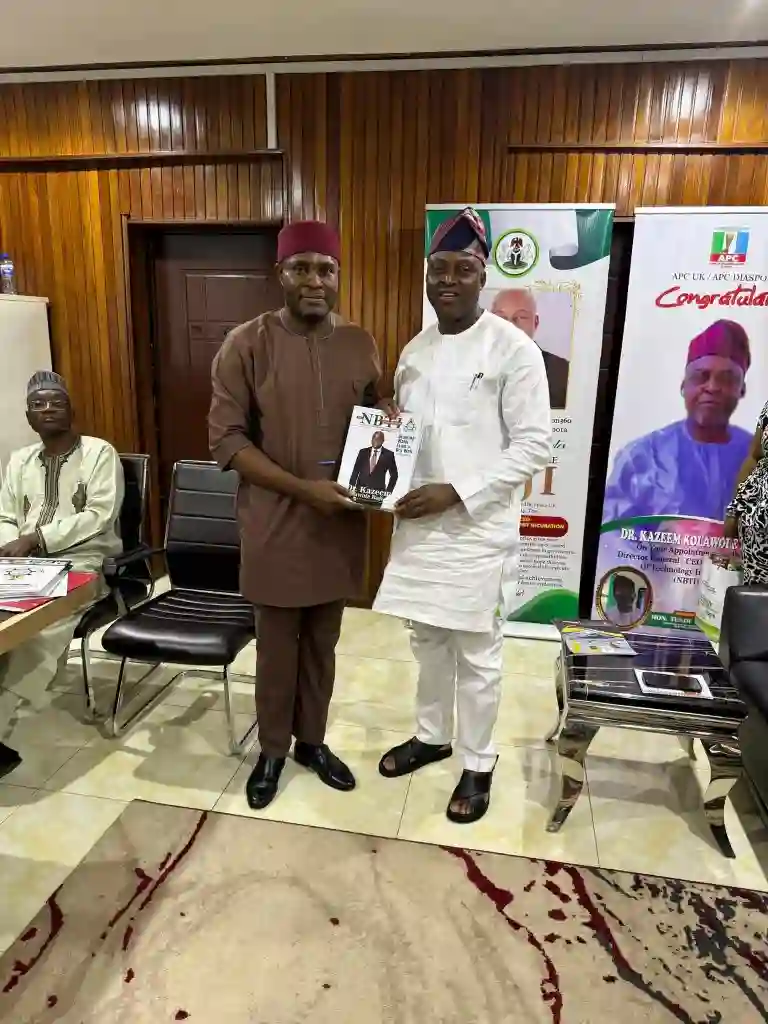The National Board for Technology Incubation (NBTI) and the Pan-African Organisation for Small and Medium Industries (PAOSMI) have officially launched a groundbreaking partnership aimed at advancing the empowerment of small and medium enterprises and accelerating continental industrialization.
The high-level engagement, which took place at NBTI Headquarters in Abuja, is described as a major milestone in the implementation of Nigeria’s Renewed Hope Agenda.
It aligns with the transformative leadership of President Bola Ahmed Tinubu, GCFR, whose Nigeria First Policy and economic vision are reshaping national development through innovation, technology commercialization, and Pan-African economic cooperation.
Welcoming the PAOSMI delegation, Dr. Kazeem Kolawole Raji, Director-General and Chief Executive Officer of NBTI, said the partnership is a strategic alignment with the Board’s mandate to drive homegrown technological innovation, incubate viable enterprises, and translate research and development into commercial success.
He commended President Tinubu for his visionary policies, global economic diplomacy, and bold reforms that are creating a fertile environment for industrial growth, job creation, and economic inclusivity.
“Under President Tinubu’s transformative leadership, Nigeria has entered a new era of technological awakening, industrial ambition, and global relevance,” Dr. Raji stated.
Dr. Henry Emejuo, Director-General and Chief Executive Officer of PAOSMI, praised Dr. Raji for his innovative strategies since his appointment in January 2025 by President Tinubu.
He noted that PAOSMI’s mission to industrialize Africa through SME development mirrors NBTI’s objectives, making this collaboration both timely and historically important.
PAOSMI operates with over 64 affiliate networks across 40 African and Caribbean countries and is leading industrial development across 16 sectors.
Through 17 technical commissions, the organization supports SMEs by providing access to harmonized African standards, capacity building, and enterprise assistance. These efforts are aligned with the African Continental Free Trade Area, which seeks to promote trade and industrial growth across the continent.
Highlighting the cassava value chain as a sector with major potential for agro-industrial transformation, Dr. Emejuo called for stronger integration with NBTI to address skill gaps, boost technology adoption, and secure funding for SMEs. He emphasized that this would unlock Africa’s full industrial potential.
Dr. Raji supported this view, stating that “Made-in-Nigeria must mean made-to-compete globally.” He revealed that NBTI currently supports over 10,000 SME products across the country and is modernizing its incubation centres for full automation with the support of strategic international investors, including partners from China.
He stressed that the Nigeria First Policy is providing an unmatched platform for local manufacturers to grow, innovate, and compete internationally.
Dr. Raji also called on the Federal Government to establish advanced technology parks in each of Nigeria’s six geopolitical zones to address post-incubation challenges.
These parks, he said, would help post-incubatees expand their operations, increase employment opportunities, and boost national productivity.
In what he described as a proud moment, Dr. Raji announced that the grand finale of the NextGen Innovation Challenge 2025 will be held on October 9, 2025, in London.
At this event, 105 Nigerian innovators will present their breakthroughs to global investors. He noted that the annual initiative is in direct alignment with President Tinubu’s vision to globalize Nigerian innovations and attract sustainable foreign direct investment into the nation’s growing innovation ecosystem.
After detailed discussions, NBTI and PAOSMI agreed to set up a Joint Committee that will focus on specific collaborative initiatives.
These will include SME training, commercialization of innovations, trade facilitation, enforcement of standards, and value chain development.
The meeting ended on a note of optimism, with both organizations committing to building a resilient ecosystem for African industrialization powered by Nigerian ingenuity.
The collaboration will be anchored on the strategic leadership of President Bola Ahmed Tinubu, GCFR, who continues to drive policies that position Nigeria at the centre of Africa’s industrial resurgence.
His leadership is seen as a symbol of hope, innovation, and economic independence for the continent, reinforcing Nigeria’s role as a key player in shaping Africa’s future industrial landscape.

